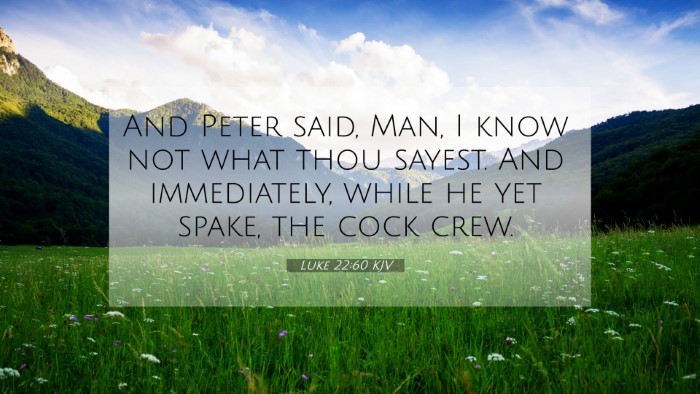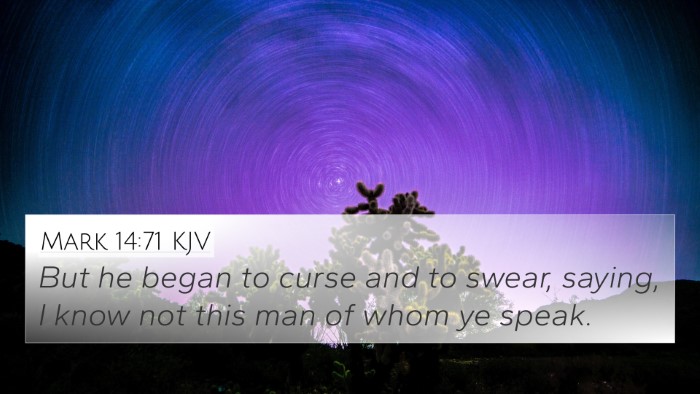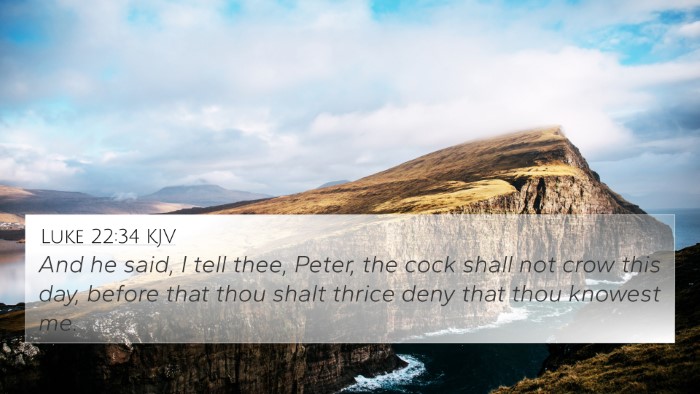Understanding Luke 22:60
Luke 22:60: "But Peter said, 'Man, I do not know what you are saying!' Immediately, while he was still speaking, the rooster crowed."
Summary of the Verse
Luke 22:60 captures a pivotal moment in Peter's denial of Christ, occurring during Jesus' trial. This moment emphasizes Peter's fear and the fulfillment of Jesus' prophecy about his denials, showcasing the fragility of human resolve in the face of persecution.
Commentary Insights
Matthew Henry's Commentary
This verse illustrates Peter's immediate reaction to being associated with Jesus. The urgency in Peter's protest signals his fear of being implicated in Jesus' plight. The crowing of the rooster acts as a powerful auditory symbol of his denial, reminding readers of Jesus’ forewarning that Peter would deny Him three times before the rooster crowed.
Albert Barnes' Commentary
Barnes provides insight into the gravity of Peter's denial. He suggests that Peter’s denial was not just an act of disowning Christ, but a profound moment that showcased the struggle between faith and fear. Peter, who once boldly declared his commitment, succumbs to the pressure of the moment, highlighting human vulnerability.
Adam Clarke's Commentary
Clarke expands on the relational dynamics at play, detailing how Peter’s denial reflects not merely an individual failure, but the collective frailty of humanity. The verse serves as a reminder of the compassion that can still exist in failure, as Peter ultimately repents and is restored by Christ after the resurrection.
Cross-References to Luke 22:60
- Matthew 26:74-75 - Chronicles the denial of Peter and the rooster's crow, echoing similar themes of weakness and remorse.
- Mark 14:70-72 - Provides a parallel narrative of Peter's denial and the subsequent rooster crowing.
- John 18:17 - Highlights Peter’s first denial when confronted by a servant girl, adding depth to his initial response.
- Luke 22:54 - Sets the scene of Peter’s following Jesus at a distance, illustrating the precarious position he finds himself in.
- Luke 22:61 - Signifies Jesus turning and looking at Peter after the denial, which embodies both confrontation and grace.
- Zechariah 13:7 - Prophetic foreshadowing of the scattering of the disciples, linking Old Testament prophecy to New Testament fulfillment.
- John 21:15-17 - Represents the restoration of Peter post-resurrection, contrasting his earlier failure with divine mercy and commission.
- 1 Corinthians 10:12 - A cautionary reminder that those who think they stand must take heed lest they fall, applicable to Peter’s situation.
- Romans 3:23 - "For all have sinned and fall short of the glory of God," echoing Peter's human frailty and the universal nature of sin.
- Hebrews 4:15 - Introduces Christ as a High Priest who understands our weaknesses, framing Peter’s weakness within the greater narrative of Christ's empathy.
Thematic Connections
Thematically, Luke 22:60 illustrates the broader narrative of disobedience, redemption, and the contrast between the frailty of human nature and the steadfastness of divine grace. This theme can be further explored through:
- Human Weakness: Across the scriptures, human frailty is a recurring motif, seen in various biblical figures who faltered yet found redemption (e.g., David, Jonah).
- Grace and Forgiveness: The eventual restoration of Peter highlights God’s forgiving nature, which permeates the New Testament teachings.
- Fear and Faith: The tension between fear and faith is central to understanding the human condition as seen throughout biblical narratives.
Tools for Bible Cross-Referencing
For those interested in exploring connections between Bible verses further, various tools and techniques can be employed:
- Bible Concordance: A reference tool for finding specific verses and their occurrences throughout the Bible.
- Bible Cross-Reference Guide: Provides systematic ways to study related verses offering thematic insights.
- Cross-Reference Bible Study: Methods focusing specifically on linking parallel narratives and teachings.
- Comprehensive Bible Cross-Reference Materials: Often include charts, software, or study guides that aid in thematic exploration.
Conclusion
Luke 22:60 stands as a powerful reminder of the grace that follows human failure and secrecy, compelling believers to delve deeper into biblical cross-references to fully understand the interconnected nature of scripture. Through careful study and reflection on cross-references, one can uncover the layers of meaning encapsulated in this and other biblical passages.
Encouragement for Study
To truly grasp the meanings of Bible verses like Luke 22:60, it is essential to utilize a variety of cross-referencing techniques. This practice not only enriches understanding but also creates a more profound appreciation for the cohesive narrative of scripture.






